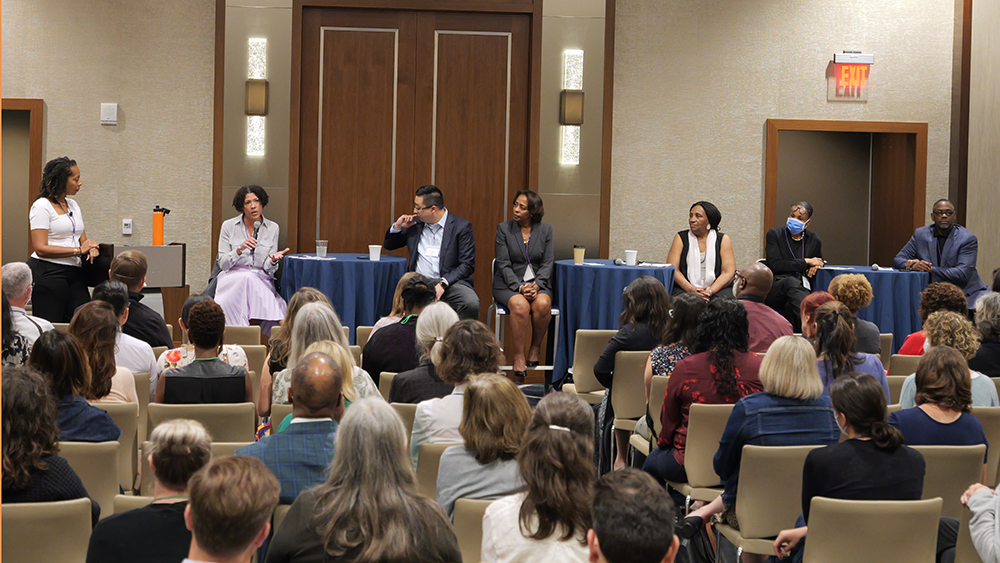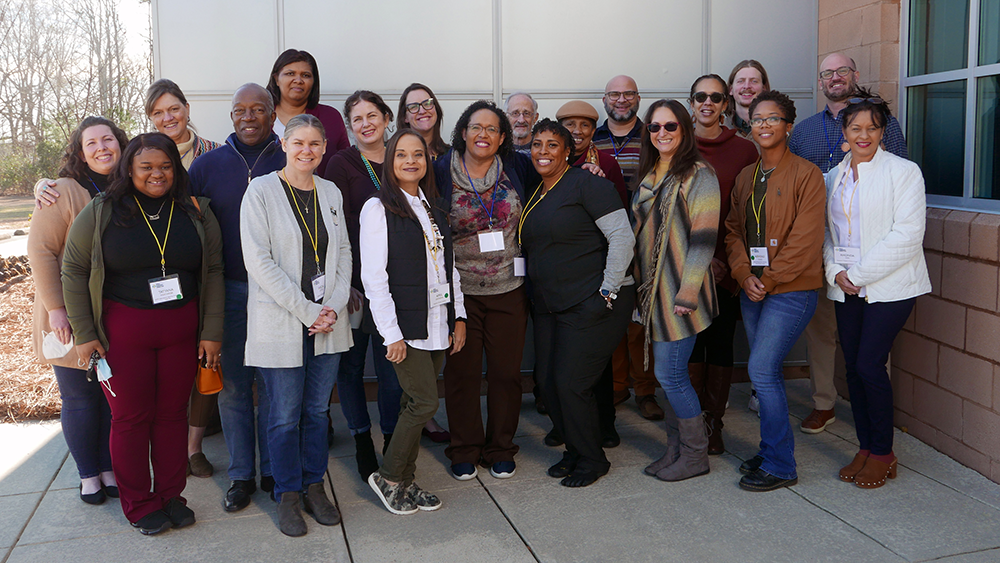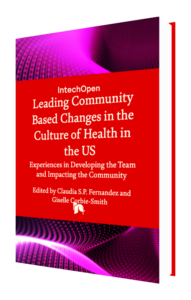Equity-Centered Leadership
Equity-Centered Leadership (ECL) is a validated model developed by an interdisciplinary team at the University of North Carolina at Chapel Hill.
Equity-centered leaders are better equipped to lead successful, scalable and sustainable efforts for systems change for better outcomes for all.

Equity-Centered Leadership for Healthcare Providers
One national program using this model is Clinical Scholars, funded by the Robert Wood Johnson Foundation.
Since 2016, 162 healthcare providers across 28 U.S. states and territories have led community efforts that are:
- Successful in reducing health disparities.
- Scalable towards public health impacts.
- Sustainable for continued impact.

Equity-Centered Leadership for Community-Academic Partners
One North Carolina program using this model is Whole Community Connection, funded by the William R. Kenan, Jr. Charitable Trust.
Since 2022, 44 community-academic partners across two rural counties, Edgecombe and Robeson, have led community efforts that are:
- Successful in advancing health equity in rural North Carolina.
- Scalable by increasing local power to focus on priorities by and at the community level.
- Sustainable through stronger relationships for collective and community-led actions.

Collaborative Work at UNC
ECL Resources and Publications
In 2015, Giselle Corbie, M.D., M.Sc., and Claudia Fernandez, DrPH, brought their decades of research and leadership experience together. Along with a team, they worked to answer: How do we equip leaders with tools centered in equity, diversity and inclusion to transform both their careers and the health of their communities?
Below is a list of resources and publications describing their findings for others looking to do similar work.
Leading Community Based Changes in the Culture of Health in the US – Experiences in Developing the Team and Impacting the Community
 Co-edited by Claudia S.P. Fernandez, DrPH, and Giselle Corbie, M.D., M.Sc., healthcare experts from nurses to social workers present a way forward which shifts away from our fragmented and often judgmental approach to health in this new book. This book is intended for individuals committed to working collaboratively to reconstruct policies and practices to support health equity, especially in communities traditionally labeled as high-risk and hard to engage. Community leaders, public health officers, county commissioners, healthcare system administrators and others will gain insights from real-world implementations to apply to their own work.
Co-edited by Claudia S.P. Fernandez, DrPH, and Giselle Corbie, M.D., M.Sc., healthcare experts from nurses to social workers present a way forward which shifts away from our fragmented and often judgmental approach to health in this new book. This book is intended for individuals committed to working collaboratively to reconstruct policies and practices to support health equity, especially in communities traditionally labeled as high-risk and hard to engage. Community leaders, public health officers, county commissioners, healthcare system administrators and others will gain insights from real-world implementations to apply to their own work.
Evaluating Leadership Development Competencies of Clinicians to Build Health Equity in America
This study describes the self-reported ratings of fifive cohorts of health care professionals trained in the Clinical Scholars program across 25 leadership development competencies. Through this hands-on, equity-centered training, the participants further developed leadership skills and applied learnings in real-time to advance health equity within the organizations and communities where they work.
READ EVALUATING LEADERSHIPLeadership Development to Advance Health Equity: An Equity-Centered Leadership Framework
Current crises require examining and reorienting the systems that have, for decades, produced health inequities. The authors offer an equity-centered leadership framework to support the development of visionary leaders for tomorrow with the mindset and skill set to challenge the paradigms that lead to inequity and health disparities.
READ LEADERSHIP DEVELOPMENTClinical Scholars: Six Core Conclusions for Training Healthcare Professionals as Leaders Impacting Unbounded Systems
Leaders face emerging and evolving challenges of unbounded systems. This article offers six conclusions to offering leadership training to healthcare professionals.
- Dedicated leadership training is powerful and there is a dose-response return on investment.
- Leaders prepared to practice in unbounded systems are equipped with equity-centered leadership that braids traditional leadership tools with EDI.
- Inclusive leadership development creates a cadre of colleagues from diverse professions, racial and gender backgrounds to collaborate within and across systems.
- Interprofessional team-based leadership development prepares leaders to work collaboratively to respond to complex issues.
- Leaders that implement action learning projects (implementation science) while strengthening individual and team-based adaptive leadership skills that are applicable across Volatile, Uncertain, Complex and Ambiguous (VUCA) conditions.
- Funding support dedicated to leadership learning and action learning projects enable deep engagement and collaboration.
Advancing Health Equity Through Equity-Centered Leadership Development with Interprofessional Healthcare Teams
This article describes the Clinical Scholars conceptual framework and the 25 competencies and four domains (personal domain, interpersonal domain, organizational domain, community and systems) of the curriculum. The evaluation framework applies the Kirkpatrick to measure learning, behavior change and results across for the first Clinical Scholars Cohort of this three-year program. Significant changes were demonstrated in learning and behavior change across the four domains including eight equity, diversity and inclusion competencies.
READ ADVANCING HEALTH EQUITYResponding To Youth Mental Health Crises By Building Resilience And Healing
By applying equity-centered leadership skills and working in an interdisciplinary way, health care providers are transforming clinical approaches to improve youth mental health. Three teams share their stories of working in and with communities to care for youth since COVID began.
READ RESPONDING TO YOUTHTraining “Pivots” from the Pandemic: Lessons Learned Transitioning from In-Person to Virtual Synchronous Training in the Clinical Scholars Leadership Program
The COVID-19 pandemic forced rapid conversion of in-person learning into distance-based instruction. This article describes adaptations to continue Clinical Scholars Leadership development programming and create/maintain a sense of community among participants during COVID-related travel restrictions.
READ TRAINING PIVOTSEquity-Centered Leadership Training Found to Be Both Relevant and Impactful by Interprofessional Teams of Health-Care Clinicians: Recommendations for Workforce-Development Efforts to Update Leadership Training
Interprofessional team-based leadership training is presented as a resource for mental health professionals and the extended healthcare workforce focusing on social determinants of health. This article presents and compares leadership participant response, learning, and self-efficacy across two cohorts. Results suggest interprofessional leadership development is applicable across a wide range of health equity issues.
READ RECOMMENDATIONSCatalyzing “Cohortness” in Leadership Programs Pivoting to a Virtual Environment
This article explores a sense of cohortness across two leadership programs, Clinical Scholars and Food Systems Leadership Institute, temporarily adapted to virtual environments during COVID-19.
READ CATALYZING COHORTNESSLearn More
Are you interested in exploring the Equity-Centered Leadership model for your organization or community? Submit a request for information below.
A CHER team member will respond in 1-2 business days.
